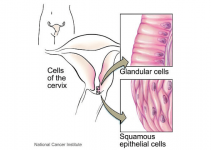 If you are pregnant, then you probably have had a slew of symptoms that you aren’t quite sure about. Whether its weird cravings, feeling like the baby may be moving, or issues with nausea and vomiting, pregnancy can bring forth quite a few symptoms that are completely unknown to a healthy woman.
If you are pregnant, then you probably have had a slew of symptoms that you aren’t quite sure about. Whether its weird cravings, feeling like the baby may be moving, or issues with nausea and vomiting, pregnancy can bring forth quite a few symptoms that are completely unknown to a healthy woman.
One of these symptoms that may have many pregnant women worried is leukorrhea.
Leukorrhea is a fancy medical term for vaginal dischargethat many women experience while they are pregnant. It is completely normal and often is just more of a nuisance that it is a medical emergency.
However, there are a few types of discharge that women should be aware of during their pregnancy.
Normal Leukorrhea
Normal discharge during pregnancy is the milky white, thin odorless discharge that doctors term leukorrhea. This type of discharge occurs due to the excess of hormones that are rushing through your body.
These hormones lead to increased secretions by your vaginal mucosa, which leads to discharge.
Estrogen and progesterone can cause this thin, milky white discharge by causing there to be an increased blood flow to your pelvis. This increase in blood flow causes your normal mucous membranes to work overtime and to produce a discharge.
Don’t worry though, leukorrhea is completely normal and actually can be a good sign that your body is responding to hormones appropriately.
Estrogen and progesterone are both super important hormones that your body needs to keep you and your baby healthy. Unfortunately, one of the side effects of all of these excess hormones is discharge.
How to Deal with Leukorrhea
Leukorrhea can be a little bit annoying, but most pregnant women take care of their excess discharge by wearing a panty liner. Panty liners allow you to feel clean and forget about your discharge for a while.
However, you should absolutely never wear a tampon while you are pregnant. If your discharge is a sign of an infection instead of leukorrhea, then a tampon will act as a reservoir for bacteria growth and can be harmful to you and your baby.
Showering regularly and keeping up good hygiene habits can also help you feel fresh throughout your pregnancy. However, never use douches and don’t even bother with feminine wipes or baby wipes.
Baby wipes, feminine wipes or anything that is advertised to help feminine discharge can actually be harmful to your vaginal health. These items can drastically change the pH of your vagina and leave you at risk for vaginal infections.
Abnormal Discharge
If you start to experience any type of discharge that isn’t white, thin and milky in appearance then you may need to call your doctor.
Pregnant women can develop vaginal infections just as frequently as their non-pregnant friends, but if a pregnant woman develops an infection it’s a bit more dire of a situation and needs to be looked after by a doctor so that you and your baby stay healthy.
Yellow Discharge
Yellow, green discharge that has a strong fishy odor is one of the most important abnormal discharges that you can develop during pregnancy.
Often, this type of discharge is associated with an infection, and most commonly the infection is bacterial vaginosis.
Bacterial vaginosis is a nasty vaginal infection that is caused by a disruption in your vaginal pH.
If you use various feminine hygiene products then you could disrupt your vaginal pH and leave you at risk of developing bacterial vaginosis.
It is best to stay away from feminine hygiene products. Your vagina only needs to be cleaned with water and mild soap. Anything else can cause harm to your vaginal flora and lead to infections.
Once you have developed bacterial vaginosis you need antibiotics, especially if you are pregnant. In a healthy, non-pregnant woman, bacterial vaginosis can be a nuisance but isn’t extremely harmful to their health.
However, in a pregnant woman, there are studies that show that BV can lead to premature birth and even miscarriage depending on how far along you are in your pregnancy.
For this reason, it is especially important to talk to your doctor about any weird discharge you are having while pregnant.
They can do a quick swab in their office and determine what antibiotics you need before you leave the office.
Thick Discharge
Another abnormal discharge is a white, thick, milky discharge that also causes a lot of itching. If this sounds familiar, then you may have a yeast infection.
Yeast infections during pregnancy can be absolutely miserable. If you feel like you have a yeast infection, then you can either go to your local pharmacy and buy over the counter medication, or you can call your doctor.
Over the counter medication can help your yeast infection, but prescription medication is safe for your baby and may cut the infection quicker.
Just like BV, a yeast infection can be diagnosed through a simple swab in your doctor’s office. They can immediately look under a microscope and tell what infection you have. You may even be infected with both yeast and BV.
Brown Discharge
Brown discharge is another abnormal discharge that could be a cause for concern. It could point to an infection such as BV or you could have lost your mucus plug and may be close to going into labor.
Call your doctor if you notice brown discharge and get to her office ASAP.
Watery Discharge
Watery discharge should also be looked after by your doctor. In later months of pregnancy, it is often benign and may even be a little leakage of urine.
However, watery discharge may also mean that your water broke and you are in labor. You should call your doctor immediately or go to the hospital to get checked.
If your water broke, but you are not experiencing contractions, then you need to be watched in the hospital as you progress to prevent infection.
To Conclude
Discharge during pregnancy can be scary, especially if you don’t know what it is coming from or why you have it.
However, if you are just experiencing white, thin, odorless discharge then you are fine. This type of discharge is known as leukorrhea and is completely normal.
If you are experiencing a discharge with an odor or have other symptoms such as itching, burning, or irritation then call your doctor.
You may just need a simple course of antibiotics or antifungal medications to help feel better and get back to enjoying your pregnancy.



